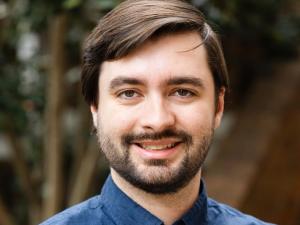Event Actions
"Designing Materials for Nuclear Environments through Grain Boundary Manipulation"
Abstract:
Increasing global energy demands have driven the use of energy-producing technologies which, historically, have relied on the unsustainable exploitation of Earth's natural resources, leading to severe environmental impacts and energy inequality. Nuclear energy, with its high energy output and low emissions, presents a viable alternative energy source, especially with advancements in minimizing hazardous pollutants through innovative fuel sources and waste processing strategies. However, the extreme conditions within next-generation nuclear reactors, such as high thermal loads and radiation fluxes, require novel radiation-tolerant materials capable of withstanding such environments. In the Accelerated Materials Discovery lab, we design alloys for extreme environments through high-throughput and automated methodologies, using targeted materials engineering strategies to enhance material properties. In this presentation, we will explore the thermal stability and radiation tolerance of model nanocrystalline alloys, which show significant promise as radiation-tolerant materials due to their high interfacial density. We will develop a framework for determining the dominant thermal stabilization mechanism in nanocrystalline alloys, followed by an examination of the role of thermodynamically stabilized grain boundaries on local temperature spikes from ion irradiation. Further tailoring of nanocrystalline microstructures through careful manipulation of amorphous grain boundary defect phases will also be discussed, and the formation and stabilization of such defect phases will be analyzed through a high-throughput flash differential scanning calorimetry study.
Bio:
W. Streit Cunningham is currently an Assistant Professor in the department of Materials Science and Engineering at the University of Virginia (UVA). He received his BS in Physics from Johns Hopkins University and his PhD in Materials Science and Engineering from Stony Brook University. His doctoral work, in the research group of Prof. Jason Trelewicz, focused on developing novel engineered microstructures for enhanced thermal stability and radiation tolerance for next-generation nuclear reactors. Following the completion of his PhD in 2021, he moved to U.C. Santa Barbara as an NSF MPS-Ascend Postdoctoral Fellow. His current group, the Accelerated Materials Discovery lab, focuses on the development of novel alloys for extreme environments through high-throughput and autonomous methodologies.
Host: Dr. David Brown
